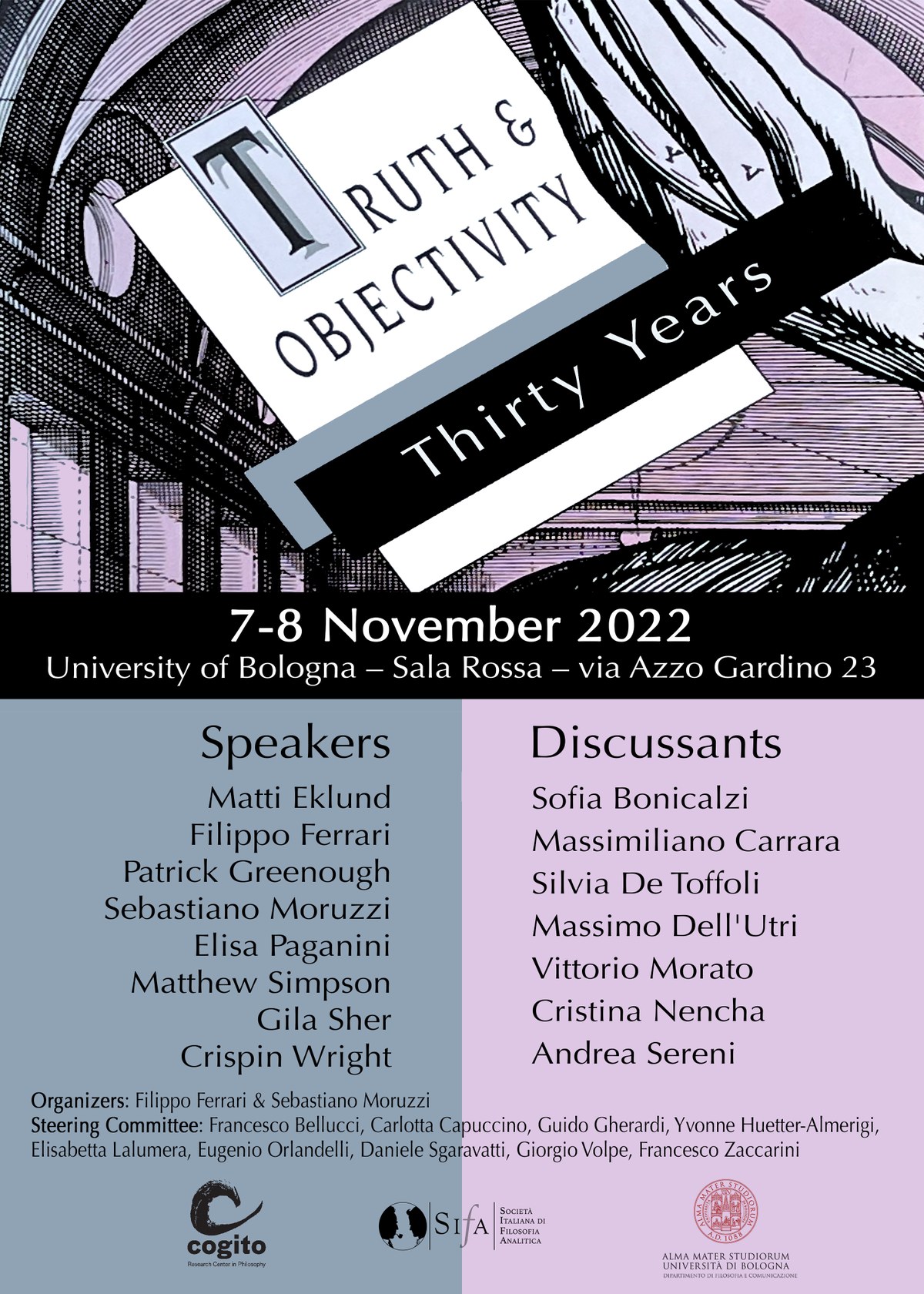International conference on the occasion of the 30th anniversary of Crispin Wright's Truth and Objectivity (Harvard University Press, 1992).
Crispin Wright is Professor of Philosophy at New York University (NYU) and Stirling University. He is a fellow of the British Academy, the Royal Society of Edinburgh, and the American Academy of Arts and Sciences. Crispin Wright has contributed to many areas of contemporary philosophy, including epistemology, philosophy of language, logic, and mathematics. He is considered among the 50 most influential living philosophers, and is the author of more than 150 articles and 10 books including Truth and Objectivity published in 1992 with Harvard University Press.
November 7th
10.00-10.30 Crispin Wright (NYU, Stirling) Opening on Truth & Objectivity
10.30-11.50 Matti Eklund (Uppsala) Truth Pluralism Generalized
Abstract: The kind of truth pluralism discussed in Truth and Objectivity is by now very well known. Somehow or other, truth can come to different things with respect to different discourses, and the ways in which truth can come to different things are closely tied to debates over realism and objectivity. Here I discuss other ways to be a truth pluralist. The starting point for my discussion is the following question: Even if truth comes to one thing with respect to actual moral discourse (or mathematical discourse, or…), can’t there be other moral(-like) discourses with respect to which truth comes to something else? I believe the answer is yes, and I explore the implications of that answer.
11.50-12.10 Coffee Break
12.10-13.30 Filippo Ferrari & Sebastiano Moruzzi (Bologna) Re-assessing the inflationary argument
Abstract: In this talk we engage with one of the key arguments of Truth and Objectivity, the so-called inflationary argument (IA). The argument is purported to show that the deflationary conception of truth (DCT) is inherently unstable: on the one hand, DCT heavily relies on the thesis that the nature of truth is exhausted by its role as a device of generalisation; on the other hand, it follows from basic principles accepted by DCT that truth is more than that since it operates as a distinctive norm of assertion and belief. Recognizing this fact leads to some form of minimal inflation of truth’s nature without requiring us to subscribe to a generalised realist conception of truth. Although Wright’s inflationary argument is philosophically very significant, a number of interpretative issues remain open—chief among which is a proper understanding of the inflationary significance of the argument. In order to clarify this important issue, we offer a reconstruction of the argument in eight steps. We then present a case in which the argument can be locally blocked in the domain of basic taste, and we compare our strategy to locally block the argument with Wright’s recent attempt to show that the inflationary argument has no inflationary significance in the domain of basic taste. We close with a few open questions concerning Wright’s new take on the inflationary argument.
13.30-15.00 Lunch break
15:00-16:20 Matthew Simpson (Cambridge) Is there space for expressivism in Truth and Objectivity?
Abstract: A cornerstone of Wright's view in Truth and Objectivity is a minimalist approach to truth. This makes it very easy for sentences to count as truth-apt. It therefore blocks traditional expressivist theories which say that the target sentences are not truth-apt. In the years since Truth and Objectivity was published, expressivists have developed a more nuanced position on truth and truth-aptitude. In this paper I show how this more nuanced position might allow an expressivist theory of a certain discourse to be one element in the suite of different theories of discourses that Wright's pluralist envisages, and what might come to light if such a pluralist did adopt an expressivist stance. What we get is a way for a Wrightian pluralist to be an expressivist in cases where such a theory is appealing.
16:20-16.40 Coffee Break
16.40-18:00 Gila Sher (UC San Diego) Truth and Realism
Abstract: In Truth and Objectivity Crispin Wright developed a conception of truth that is detached from the realism‒antirealism debate. This conception is both minimalist and pluralist. It is minimalist with respect to the general principles of truth and pluralist with respect to its special principles which may vary from field to field: e.g., correspondence in some fields, coherence in others. But what happens if it turns out that the function of truth in human life requires it to be substantive correspondence in all fields (not necessarily the same type of correspondence in all fields, but correspondence all the same)? How would this affect the relation between truth and realism? Would it force us to be realists in all fields? And what would realism in fields like ethics and mathematics amount to? In this talk I will try to answer these questions.
18.00-20.00 Drinks and free discussion (at a local pub)
20:00 Conference dinner
November 8th
10.00-11.20 Elisa Paganini (Milano Statale) Varieties of super-assertibility
Abstract: I intend to put forward some considerations on how, in my view, the notion of (super-)assertibility has changed over the last thirty years. In the light of these considerations, I aim to make some observations on how, from my perspective, the landscape for the debate between realists and anti-realists has changed.
Abstract: It's common to think that Pluralism about Truth is the main lesson to be gleaned from Wright's Truth and Objectivity. Arguably the real lesson is something else altogether: namely Minimalism about X, for any concept X. Or so I will argue.
11:20-11.40 Coffee Break
11.40-13.00 Patrick Greenough (St. Andrews) Minimalism about X, for any Concept X
13.00-14.30 Lunch break
14:30-16:30 Round Table//Final Discussion
Discussants: Sofia Bonicalzi (Roma Tre), Massimiliano Carrara (Padova), Silvia De
Toffoli (IUSS), Massimo Dell’Utri (Sassari), Vittorio Morato (Padova), Cristina Nencha
(L’Aquila), Andrea Sereni (IUSS
Organizers: Filippo Ferrari, Sebastiano Moruzzi
